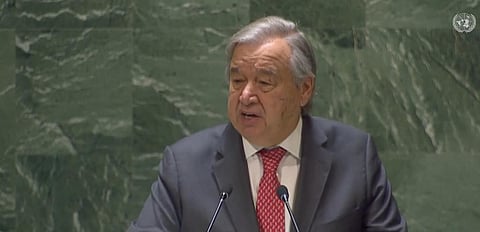

Water is ‘humanity’s lifeblood‘. But humans are draining through ‘vampiric overconsumption and unsustainable use’, Antonio Guterres, United Nations (UN) secretary-general said at the opening of the UN Water Conference in New York City on March 22, 2023.
Water is a human right and critical to development that will shape a better global future, he added.
“But water is in deep trouble. We are draining humanity’s lifeblood through vampiric overconsumption and unsustainable use, and evaporating it through global heating. We’ve broken the water cycle, destroyed ecosystems and contaminated groundwater,” Guterres stated.
“At this week’s UN Water Conference, I’m urging countries to come together and find solutions to ensure everyone, everywhere has access to clean and safe water. Now is the moment for game-changing commitments to bring the WaterAction Agenda to life,” he added.
The three-day event, formally known as the 2023 Conference for the Midterm Comprehensive Review of Implementation of the UN Decade for Action on Water and Sanitation (2018-2028), falls at the halfway point for achieving the Sustainable Development Goals.
It is co-hosted by the governments of Tajikistan and the Netherlands. The meet aims to raise awareness on the global water crisis and decide on concerted action to achieve the internationally agreed water-related goals and targets.
India, Bulgaria, Zambia, Malaysia, France, Sudan, Yemen, Ukraine and United Kingdom are among the participant countries and parties.
Guterres said governments must develop and implement plans that ensure equitable water access for all people while also promoting water conservation, and they must work together to jointly manage this precious resource.
The secretary-general also called for investment in disaster-resilient pipelines, water-delivery infrastructure, and wastewater treatment plants, and in new ways to recycle and conserve water.
“Nearly three out of four natural disasters are linked to water. One in four people lives without safely managed water services or clean drinking water. And over 1.7 billion people lack basic sanitation. Half a billion practice open defecation. And millions of women and girls spend hours every day fetching water,” Guterres noted.
He also highlighted the proposed SDG Stimulus plan and reforms to the global financial architecture aimed at ramping up investment in sustainable development.
“International financial institutions should develop creative ways to extend financing and accelerate the re-allocation of Special Drawing Rights. And Multilateral Development Banks should continue expanding their portfolios on water and sanitation to support countries in desperate need,” he said.
SDG Stimulus aims to offset unfavorable market conditions faced by developing countries through investments in renewable energy, universal social protection, decent job creation, healthcare, quality education, sustainable food systems, urban infrastructure and a transformation to working digitally.
“This conference must represent a quantum leap in the capacity of Member States and the international community to recognise and act upon the vital importance of water to our world’s sustainability and as a tool to foster peace and international co-operation,” he added.
Guterres went on to call for action in four key areas, starting with closing what he called “the water management gap”.
“I see four key areas to accelerate results and change the present situation. First — closing the water management gap. Governments must develop and implement plans that ensure equitable water access for all people while conserving this precious resource.”
The second was massive investment in water and sanitation systems. The third was focusing on resilience. “We cannot manage this 21st century emergency with infrastructure from another age,” Guterres said.
The fourth was addressing climate change
The UN chief urged countries to “spare no effort” to limit global warming to 1.5 degrees Celsius and deliver climate justice to developing countries.
He cited his proposal to the G20 most-industralised nations to establish a Climate Solidarity Pact in which all big emitters make extra efforts to cut emissions.